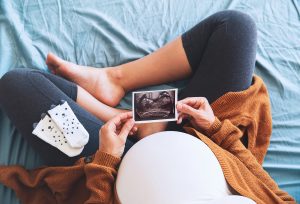As the world continues to grapple with the pandemic and governments take measures, some of them extreme, to stop the spread of the virus, it’s a disconcerting time for most people, and potentially even more so for pregnant women or new mums.
Pregnancy is supposed to bring joy, excitement and the anticipation of the journey ahead, but for many pregnant women – and new mums – the Covid-19 pandemic has probably created a sense of unease, anxiety and perhaps panic, with the many unknowns surrounding this novel, highly-contagious virus for which there is no vaccine available yet.
As the days and months pass in the fight against the virus, research is shedding light on its effects and the likelihood of potentially at-risk population groups, such as those who are pregnant, of catching Covid-19.
According to Queensland based Obstetrician and Gynaecologist Dr Drew Moffrey, the reassuring news is that pregnant women and new mums are “no more likely” to catch Covid-19 than others, and if they do, their “symptoms are [likely to be] no worse”.
“It’s very different to previous issues, such as SARS [severe acute respiratory syndrome], swine flu and bird flu … [where] the mortality was quite alarming – if you were pregnant and you caught SARS, the mortality rate was nearly 50 per cent,” he says, adding that if a pregnant woman catches Covid-19, the symptoms and severity experienced are not greater, which he says is “fantastic”.
Dr Tal Jacobson, from Brisbane women’s health clinic Eve Health, which specialises in fertility, gynaecology and obstetrics, agrees, adding that “currently there’s no information that pregnant women are at greater risk of becoming infected or becoming unwell if they do become infected”.
He adds that there is also “no evidence of increased risk of miscarriage or other pregnancy complications” with Covid-19.

However, Dr Moffrey explains that, as with flu, it may depend on where the mum is at in terms of the trimester.
“If you caught [Covid-19] in the first trimester,” he says, “there’ve been a few case reports of people having such high fevers and being so respiratory compromised, they’ve had a miscarriage, but … we have the same issue with [mums who] catch influenza A in the first trimester, because of such high fevers.”
He adds that given this is the case, there is no great risk of experiencing pregnancy complications with Covid-19.
In terms of what the experts call ‘vertical transmission’ – that is, passing on Covid-19 from mum to baby – according to Dr Moffrey, “there’s been only one report”, in France, of a baby being delivered and testing “positive for Covid-19 straight away”.
“But that’s the only case that I’m aware of – of actual vertical transmission, out of hundreds that have been reported so far,” he says.
“There’ve been a lot of cases where pregnant women who’ve caught it [Covid-19] – they’ve swabbed the baby, they’ve swabbed the amniotic fluid, they’ve tested the placenta and there’s actually no signs of vertical transmission.”
Dr Jacobson adds that while there may be a “small risk of vertical transmission from mother to baby … in general, babies with Covid-19 have remained well and not required extra care”.
‘All routine precautions apply’
Although reassurance is sought to ease the undercurrent of anxiety we’re all living with – particularly for mums and pregnant women – being careful to avoid catching the virus remains very important because prevention is always better than cure.
“All the routine precautions apply,” Dr Jacobson says.
“Regular hand sanitisation, avoid touching your face, social distancing, work from home if possible, a low threshold for mask wearing.”
Dr Moffrey adds: “If you’re pregnant and you’re in a high-risk job such as a healthcare worker or teacher, you should be trying to step back from frontline duties, because there’s still that small risk. So, while we think everything is fine, prevention is better than treatment, obviously.”
The message pharmacies should be spreading
Dr Moffrey says pharmacy staff can “reassure mums that they don’t need to be too concerned if, unfortunately, they catch Covid-19”.
“But they should be doing all their standard precautions, such as social distancing and handwashing, and in the current climate, I’d even be encouraging masks, [especially] if they’re in places where they can’t effectively social distance, such as public transport or restaurants.
“I’d also be suggesting that they can reassure them as well that if they do the best they can with keeping a healthy immune system and a healthy pregnancy, they shouldn’t have too many problems.”

Reassuring pregnant women and new mums is one of the most important roles of pharmacy during this pandemic, Community Pharmacist and Master Herbalist Gerald Quigley says.
“We need to reinforce reassurance,” he says.
“When you look at pregnancy and childbirth … the focus should be on the time of joy, not worrying about things that haven’t happened that put a damper on the time of enjoyment.
“And I think that’s, once again, the role of the pharmacists, and pharmacy is a place of reassurance and guidance – this is more important than ever. It’s always been important but at the moment it’s more important than ever.
“Guidance – you know, you walk in and there might be six different pregnancy and breastfeeding supplement brands … which ones are best.
“Those sorts of things pharmacy staff should be confident in suggesting, and if they have any questions, of course, they should be directed to the pharmacist who should be able to confidently give the answer.
“There’s a fear – a lot of it is media driven – that we just need to harness and not let that take away the joy of new parenthood. That’s where a calm pharmacist [and pharmacy assistant] can make a difference.”
To read the feature as it appears in this month’s issue of Retail Pharmacy Assistants magazine, visit: rpassistants.com.au/magazines/retail-pharmacy-assistants-october-2020







